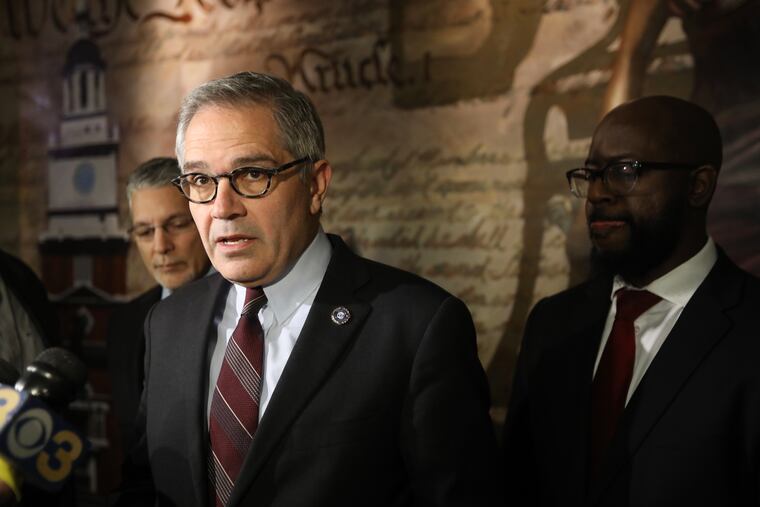Philly DA Larry Krasner withdraws office from statewide prosecutors group
Krasner has withdrawn his office from the Pennsylvania District Attorneys Association, saying the advocacy group supported regressive or overly punitive policies and represented "the voice of the past."

Philadelphia District Attorney Larry Krasner has withdrawn his office from Pennsylvania's largest prosecutors' association, saying the advocacy group has supported regressive or overly punitive policies and represented "the voice of the past."
Krasner, whose first 11 months in office have attracted national attention for his reform-driven agenda, said Friday that he believed that the Pennsylvania District Attorneys Association was at least partly responsible for an explosion in the state's prison population over several decades, and that it continues to back ideas that would make the problem worse.
"They have been claiming that Philadelphia supports this absolute nonsense, this throwback set of policies, and we do not," Krasner said during a speech at an "Innovation in Prosecution" conference at the University of Pennsylvania. He later added: "The Pennsylvania District Attorneys Association will not claim legitimacy of its most important criminal justice jurisdiction and try to take us back 40 years. No."
Richard W. Long, the association's executive director, said in an email that he was "disappointed, but not surprised" by Krasner's remarks, which he called "a troubling misrepresentation of our organization and the dedicated prosecutors who protect our communities."
The organization, whose 1,200 members include top prosecutors and assistant district attorneys from across the state, offers training sessions, holds several annual meetings, and lobbies for criminal justice-related legislation.
Long said Krasner "has made it very clear that he would rather use the PDAA as a political straw man than engage Pennsylvania's 66 other district attorneys of both parties in a productive conversation." He added: "Reasonable prosecutors can and do disagree on how to approach this mission. But the level of vitriol Mr. Krasner is directing at our members and how they go about their business is divisive and unproductive."
Long said Krasner's withdrawal marked the first time since at least 2010 that one of the state's 67 county prosecutors had renounced an office's membership in the group.
Krasner's decision and explanation represent his latest attempt to shake up a criminal justice system that he has frequently and fiercely criticized. Since taking office, the former defense attorney has not shied away from the impassioned rhetoric he used on the campaign trail, describing a need to recalibrate the culture of the office and rethink how it prosecutes defendants.
In turning his eyes toward the statewide association, Krasner expanded the scope of his broadsides to include other prosecutors' offices and legislative leaders. During his speech, titled "The Urgency of Now," Krasner said, among other things, that he believed some rural leaders were eager to accept — if not encourage — the imprisonment of city residents as a way to create jobs at prisons and help receive other types of government funding.
"We have a motivated bunch of rural counties — motivated — who want to have our Philadelphians, often black and brown Philadelphians, in their jails, because it gives them power, it gives them money," Krasner said.
Efforts to reach prosecutors in Luzerne, Centre, Huntingdon, and Somerset Counties — each of which has two state prisons — were unsuccessful Friday.
But Chester County District Attorney Thomas Hogan criticized Krasner's speech in a Facebook post Friday evening. "To the counties outside of Philadelphia, do not let this blight spread, unless you want to end up like today's Philadelphia, riddled with violence and lawlessness," Hogan wrote.
Ben Waxman, a spokesperson for Krasner, said in a text message that Hogan was "welcome to come to Philadelphia anytime and debate Larry in a public forum … assuming he's not too scared to come to our horrible city."
As for the association, Krasner said its members were largely white, male, or conservative. He said they had contributed to the state's increased prison population and its world-leading population of juvenile lifers. And he said it supported legislation or policies — such as increasing penalties for fentanyl, or seeking to restore some mandatory minimum sentences — that would impede efforts to reform the criminal justice system.
"We have a Pennsylvania District Attorneys Association … that would have you believe that the war on drugs all over again is a good idea — for their own incumbency, for their own ambition, for the economies of their own counties," Krasner said.
Raymond J. Tonkin, the association's vice president and Pike County district attorney, said Krasner's decision to leave the association was "unfortunate," adding: "We welcome all voices at our table."
Krasner, for his part, said he hoped to be able to work with the association again in the future, and that he believed self-described reformers winning prosecutorial elections in other states was a sign that more reform-oriented voices were emerging.
"Those of us who seek a future that looks like criminal justice reform, we are all becoming the Goliath," he said.